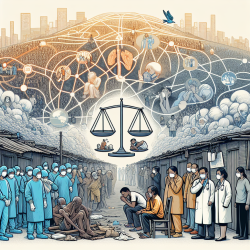Tuberculosis (TB) remains a significant public health threat, particularly among vulnerable populations such as those living in homeless shelters. The research article titled "Can’t Stop Coughing (But I Need to Get Back to the Shelter by 6)" provides a comprehensive case study that highlights the challenges and solutions involved in managing TB outbreaks. This blog post aims to help healthcare practitioners enhance their skills by implementing the outcomes of this research or encouraging further study.
The Socioecological Model: A Framework for Understanding TB Transmission
The socioecological model is a critical tool for analyzing TB transmission. It considers multiple levels of influence on health behaviors, including individual, interpersonal, organizational, community, and policy levels. By applying this model, practitioners can better understand the complex factors contributing to TB outbreaks in homeless shelters.
- Individual Level: Factors such as smoking, substance abuse, and previous exposure to TB play a significant role in individual susceptibility.
- Interpersonal Level: Social networks within shelters can facilitate the spread of TB. Understanding these connections is crucial for effective contact tracing.
- Organizational Level: Policies within shelters regarding ventilation and hygiene can impact TB transmission rates.
- Community Level: Community resources and support systems are vital for prevention and treatment adherence.
- Policy Level: Public health policies must balance individual autonomy with community protection.
Legal Implications and Ethical Considerations
The management of TB outbreaks involves navigating complex legal and ethical issues. Healthcare practitioners must ensure compliance with public health laws while respecting patient confidentiality and autonomy. Key considerations include:
- Isolation vs. Quarantine: Understanding the difference between these strategies is crucial for effective outbreak management.
- Court Orders for Treatment: Legal action may be necessary to ensure treatment adherence in non-compliant cases.
- HIPAA Exemptions: Public health exemptions allow for necessary information sharing to protect community health.
Improving Practitioner Skills Through Research
This case study underscores the importance of ongoing research and education for healthcare practitioners. By staying informed about the latest developments in TB management and public health strategies, practitioners can improve their ability to respond effectively to outbreaks.
Read the original research paper "Can’t Stop Coughing (But I Need to Get Back to the Shelter by 6)"










